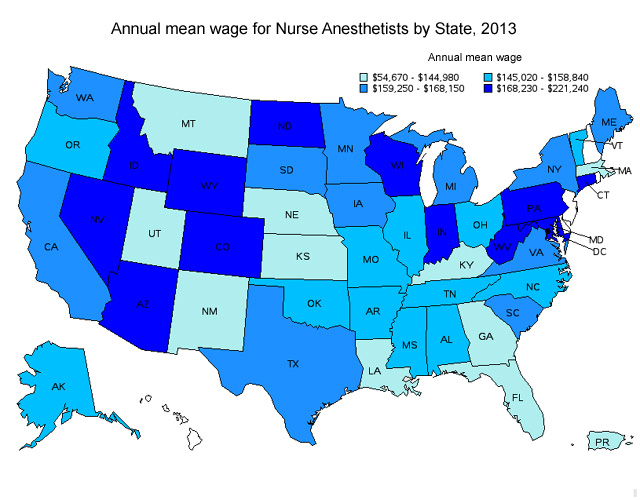Certified Registered Nurse Anesthetist (CRNA)
Certified Registered Nurse Anesthetists (CRNAs) are unique amount nurses in that they administer anesthesia to patients undergoing surgical, medical or similar healthcare procedures, just as doctors would. CRNAs assist patients with all types of medical procedures that require anesthesia, including cosmetic surgery, heart surgury, chornic pain management, etc. They practice in hospitals, clinics and other inpatient medical and healthcare facilities.Nurse Anesthetists work closely with physicians, dentists, surgeons, and other medical professionals while fulfilling their duties. CRNAs must complete extensive training and consequently are provided more autonomy in fulfilling their duties than most practicing nurses.
In the United States today, there are over 36,000 practicing certified registered nurse anesthetists, of these about 50 percent are men. This is surprising figure given that only about 8 percent of all nurse practitioners nation wide are men. While most larger, metropolitan areas rely on anesthesiologists to administer anesthesia in rural American CRNAS are often the only medical specialists available to administer anesthesia. Due to the proliferation of CNRAs, many rural medical clinics and hospitals that previously could not administer anesthesia are now able to offer surgical and obstetrical services with the help of nurse anesthetists.
A large number of managed care providers prefer using CRNAs in their facilities since they are excellent anesthetists and they are much less expensive than anesthesiologists. In addition, the use of CNRAs to administer anesthesia is reducing costs for insurance companies as well. During the 1980's, the U.S. Congress passed a law that allocated Medicare funds to support the cost of use nurse anesthetists.
Working Conditions
You'll find CRNAS working in just about every medical or healthcare facility where anesthesia is administered, including surgical units, hospitals, obstetrical delivery rooms, physicians' clinics, dental offices, pain management clinics, veterans' hospitals, cosmetic surgery centers, military hospitals, etc.
Career opportunities abound and there are plenty of job positions for qualified nurse anesthetists today, and for years to come. The Department of Health and Human Services has reported that CRNAs are in-demand everywhere in the nation.
Education and Training Requirements
Nurses anesthestist programs only admit licensed registered nurses who hold a bachelor's of science in nursing (BSN) degree and have at least a year of work experience in a medical or healthcare facilitiy where acute care is provided. Nurses anesthetist programs are master's degree level programs and usually take 2 to 3 years to complete. In addition to indepth classroom instruction, these programs provide hands-on training in hospitals and/or medical clinicals where anesthesia is administered. Upon completion of your degree program, you'll be required to pass a national examination in order to become certified as a nurses anesthetist. As a CRNA, you'll be required to complete at least 40 hours of continuing education credits every 2 years to keep your license.
Practice Settings
The following are the most common medical and healthcare facilities where CRNAs practice:
- Hospitals
- Obstetrical delivery rooms
- Dental Offices
- Podiatrist clinics
- Ophthalmologist clinics
- Plastic surgeon clinics
- Cosmetic surgery centers
- Military hospitals
- Veteran’s hospitals
- Public health clinics
- Other surgical clinics
Since CRNAs are advanced practice specialists, they are well respected within the nursing and medical fields, and are provide a fair amount of autonomy. They are also one of the highest paid of all nurse specialists. On average, nurse anesthetists earn about $100,000 a year and some make well over $150,000 a year (three times the national average for registered nurses).

About
Privacy Policy
Contact Us
Submit a Resource
